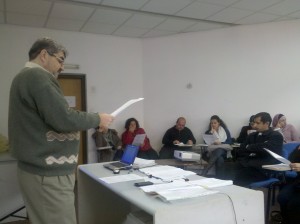Professional Development for Healthcare Cultural Competency Coordinators from around the country – Summary of Day One
We’ve taken yet another step in becoming one of the national leaders and reference points of Cultural Competency in the health care system in Israel. On Monday, 23 April we held the first meeting of a professional development seminar cultural competency coordinators from around the country. This is the first such seminar ever to take place in Israel! Our 16 participants included representatives from the major hospitals in the country: Hadassah Medical Center and Sha’are Zedek in Jerusalem; Shiba-Tel Hashomer and Sourasky Medical Center in the Tel Aviv area, Rambam in Haifa, and more.
We have been working to advance cultural competency in the health care system in Israel since 2007, and we are in constant contact with most of the cultural competency coordinators around the country. Most of these coordinators have been appointed since the publication of the Ministry of Health’s Cultural Competency Directive, published in February 2011, that will require medical interpretation services, education and training of medical staffs, environmental adaptations of all health care institutions by 2013. As a first step, the Directive requires health care organizations to appoint a cultural competency coordinator to be responsible for all the processes that work toward equal cultural and linguistic accessibility for all.
Our unique seminar is taking place in cooperation with the Ministry of Health and is a natural continuation of the Directive. The training will provide knowledge and tools to enable cultural competency coordinators to assimilate the Directive in their institutions. It is important to note that most cultural competency coordinators are already in senior management positions in their organizations.
The 5-day training seminar, which will meet weekly until the end of May, will include 50 hours of frontal lectures as well as a webinar with cultural competency coordinators from Canada and the USA. Our funders for this course are the Jerusalem Foundation and the New Israel Fund. The course is being held at the Nursing School at the Tel Aviv Sourasky Medical Center.
The training course will cover:
• Introduction to Cultural Competency: Medical interpreting and translation and mediation in health services, models of intercultural communication between patient and caregiver, cultural dimensions in interpersonal communication, dealing with political and social tensions, different cultures’ approaches to health and sickness, and more.
• Practical guidance for cultural competency processes in health care organizations – from the cultural competency coordinator’s first steps to full organizational adaptation.
It will also include guest lectures on the following subjects:
• Inequality in the health care system and the role of the cultural competency coordinator in reducing gaps.
• Acquaintance with the main theories of cultural competency in Israel and around the world.
• Tools for implementing principles of cultural competency in a health care organization.
• Tours of hospitals and clinics that are undergoing cultural competency processes.
• Clinical aspects of different cultural approaches to sickness and health.
• Culturally-dictated social norms.
• Cultural competency from the viewpoint of health organization administration.
• Cultural competency from the viewpoint of social organizations dealing with community health.
The opening lecture was given by Dr. Emma Averbuch from the Unit of Decreasing Health Inequality at the Division of Health Economics and Insurance Division of the Israeli Ministry of Health. Dr. Averbuch emphasized the importance of the cultural competency coordinator and how he or she can contribute to decreasing inequality in health care. She also surveyed the Ministry’s activities thus far in advancing cultural competency and decreasing inequality in the system.

Prof. Leon Epstein speaks on Inequality in Health at the Cultural Competence Coordinators training
The participants also had the first session covering the “Guide for Cultural Competency Processes in Health Care Organizations”, which is a practical guide we developed over the past 2 years. It details the steps that must be taken to assimilate cultural competency principles in an organization. This meeting concentrated on defining the role of the cultural competency coordinator, as well as first steps in creating a suitable buzz within an organization for cultural competency. In addition, the participants related their experiences with the community, and the discussion that followed focused on the need to establish and expand these relationships to be helpful in times of crisis.
Part of the training included a practical exercise in creating change. Each participant was asked to choose a small initiative that is related to at least one component of cultural competency that he or she wanted to change by the end of the training course at the end of May. This initiative needed to be something easily implementable and with high visibility in the organization. Participants chose projects such as mapping needs and resources, linguistic accessibility of restrooms, and more.

Simulation of a case of cultural competence at the training
Two guest lectures dealt with the relationship between risk management and cultural competency, from Ronen Regev-Kabir, Deputy Director, Public Trust organization, and Netalie Goldfarb, the Care Competency Unit of the Ministry of Health. Our own Dr. Hagai Agmon-Snir closed the day with a workshop on cultural dimensions and the main values of interpersonal communication, to give a taste of the cultural competency workshop that will be the focus of the second workshop on 30 April.
In parallel to this meeting, an Internet discussion group was established that will deal with cultural competency in the health care system in Israel. There will be participants from within and without the health care system and it will enable participants to share knowledge in this area. You can view the discussion group and the course’s accompanying materials here.

